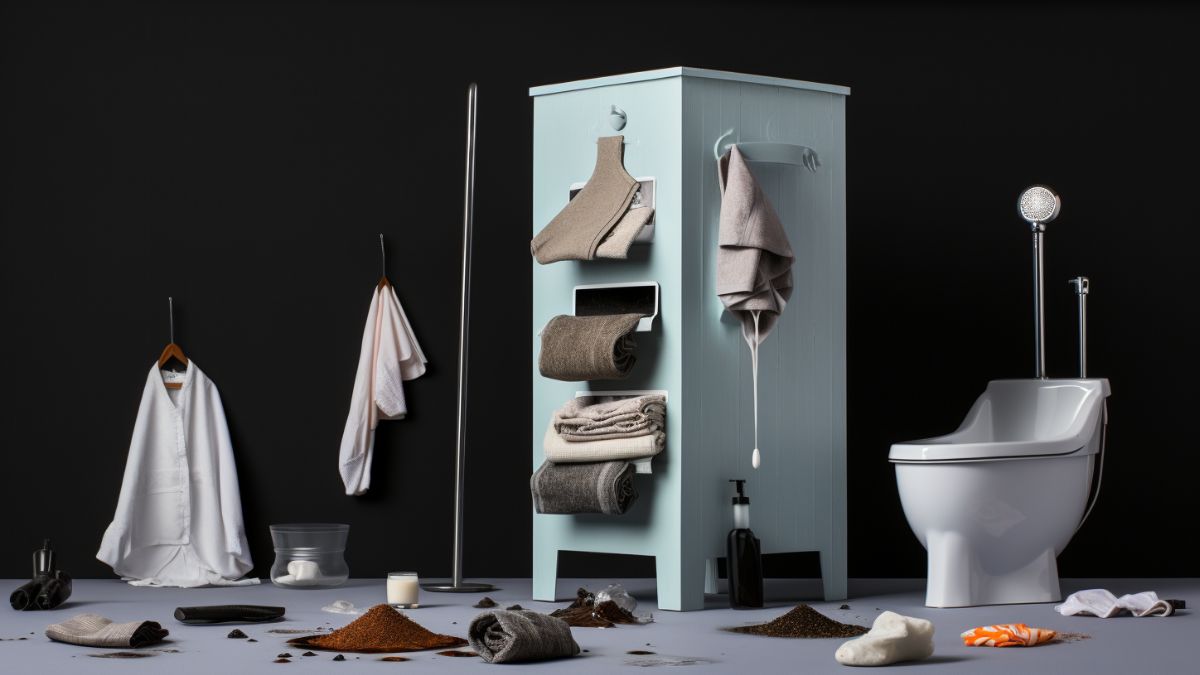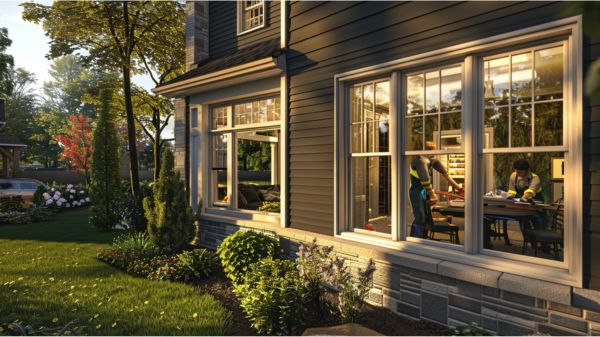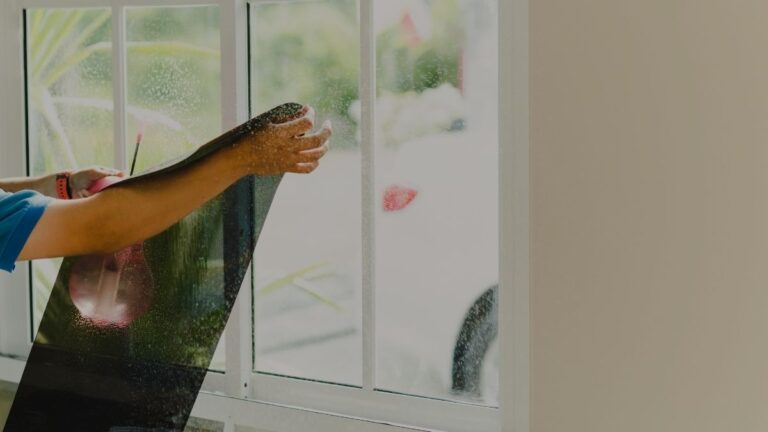Bad Smell at Home: Uncovering The Most Common Causes
Do you ever feel like you’re playing a game of hide and seek with those mysterious, unpleasant smells in your home? Well, get ready to solve the case because we’re here to help you uncover the 10 most common causes of bad smell at home and their solution.
From funky food leftovers to sneaky plumbing issues, we’ll guide you through the sniffing adventure, providing practical solutions to eliminate those odors and make your home a fresh and inviting haven. Keep on reading to discover the secrets behind those not-so-pleasant scents!
Takeaways
- Food-related causes of bad smells include spoiled food in the refrigerator, rotten fruits or vegetables, burnt food in the oven or on the stove, and moldy leftovers.
- Plumbing issues such as clogged or backed-up drains, sewer line problems, leaking pipes, dry P-traps in sinks or toilets, and water heater issues can cause bad smells.
- Household appliances like dirty dishwashers, moldy washing machines, stale water in humidifiers, unclean garbage disposals, and dusty or dirty air conditioner filters may emit unpleasant odors.
- Poor ventilation, pet-related causes, mold and mildew growth, smoking and tobacco-related odors, household cleaning products, pest infestations, and environmental factors can also contribute to bad smells at home.
If you leave food out for too long, it can lead to unpleasant odors in your home. Preventing food-related odors is crucial in maintaining a fresh and inviting living space. Properly storing and disposing of food can help eliminate unwanted smells.
Additionally, identifying plumbing issues is essential as they can also contribute to bad odors. Clogged or backed-up drains, sewer line problems, and leaking pipes should be addressed promptly.
Maintaining clean household appliances is another key aspect. Regularly cleaning your dishwasher, washing machine, garbage disposal, and air conditioner filters can help prevent odor buildup.
Improving ventilation in the home is vital as well. Opening windows, unblocking air vents, and installing exhaust fans in bathrooms and kitchens can help circulate fresh air and reduce odors.
Lastly, eliminating pet odors is crucial for a pleasant-smelling home. Regularly cleaning litter boxes, washing pet bedding, and grooming your pets can significantly reduce odors.
Plumbing Issues Causing Bad Smell at Home
Address clogged or backed-up drains promptly, as they can cause unpleasant smells in your home. Common plumbing issues causing bad smells include clogs in the pipes, sewer line problems, leaking pipes, dry P-traps in sinks or toilets, and water heater issues.
To identify and fix plumbing odors, it’s important to inspect the drains and pipes for any blockages or leaks. Regular maintenance and cleaning of the plumbing system can help prevent bad smells from plumbing problems.
Dealing with sewer line problems and odors may require professional assistance to locate and repair any damage or blockages in the sewer line. Dry P-traps can be a common cause of bad smells, but can be easily fixed by pouring water down the drain to restore the water barrier.
Taking these steps will help eliminate unpleasant odors and create a fresh-smelling home.
Unpleasant Odors From Household Appliances
Are you wondering why your household appliances are emitting unpleasant odors? A thorough analysis by a home inspector or environmental specialist would reveal the various causes of bad smell at home. They’d carefully examine all possible sources and identify the underlying reasons behind each odor. These professionals possess extensive knowledge about common sources of odors, such as mold, sewage issues, pet dander, or chemical off-gassing.
To address the specific odors you may be experiencing, they’d offer practical advice and potential solutions. When it comes to household appliances, cleaning techniques and maintenance tips are essential. Regularly clean your dishwasher to remove food debris and prevent mold growth. Clean your washing machine to eliminate any mildew or mold buildup. Empty and clean your garbage disposal to prevent odors from lingering.
Additionally, changing air conditioner filters regularly and cleaning humidifiers can help eliminate stale odors. Following these preventive measures and troubleshooting appliance issues can ensure that your household appliances don’t contribute to unpleasant odors in your home.

Bad Smells Due to Poor Ventilation
To combat bad smells due to poor ventilation, open your windows and doors regularly to allow for fresh air circulation. This will help remove stagnant air and replace it with clean, oxygen-rich air from outside.
In addition to opening windows and doors, there are other ventilation solutions that can improve indoor air quality and eliminate bad odors. Consider using air purifiers to filter out pollutants and allergens, which can contribute to unpleasant smells.
Natural air fresheners, such as essential oil diffusers or houseplants, can also help freshen the air and mask any lingering odors. Don’t underestimate the importance of fresh air in your home, as it can greatly impact the overall smell and feel of your living space.
Follow these tips for improving indoor air quality and enjoy a fresher, more inviting home environment.
Related Post: Sustainable Home Insulation: The Ultimate Guide for Eco-Homes.
If you have pets, both accidents and neglect can cause bad smells in your home. Pet-related causes of bad smell at home include:
- Pet urine or feces accidents
- Dirty litter boxes
- Wet or dirty pet bedding
- Pet hair and dander buildup
- Unwashed pet toys or accessories
To control pet odors, regular pet grooming is important. Bathing and grooming your pets on a consistent basis can help eliminate odors and keep them smelling fresh. You can also use odor absorbing products such as activated charcoal or baking soda to eliminate pet smells.
Indoor air purifiers can be effective in reducing pet-related odors in the home by filtering out airborne pet dander and other particles. Additionally, using pet-friendly cleaning tips and safe and effective cleaning methods can help remove pet odors.
Mold and Mildew Growth and Bad Smell at Home
If you notice a musty smell in your home, it could be due to mold and mildew growth. Mold and mildew can thrive in damp and humid environments, causing unpleasant odors that can permeate your living space.
Here are some common causes of mold and mildew growth and tips for dealing with them:
Preventing mold and mildew growth:
- Ensure proper ventilation in your home by opening windows and using exhaust fans.
- Use dehumidifiers to reduce moisture levels.
- Fix any leaks or water damage promptly.
- Keep indoor humidity levels below 50%.
Removing mold and mildew odors:
- Clean affected areas with a mixture of water and vinegar or hydrogen peroxide.
- Use baking soda to absorb odors.
Tips for dealing with mold and mildew:
- Remove and replace moldy materials, such as carpets or bathroom tiles.
- Use mold-resistant paint in areas prone to moisture.
- Regularly clean and dry areas that are susceptible to mold growth.
If you have ever smoked or allowed smoking in your home, you may have experienced the lingering and unpleasant odors that come with it. Removing tobacco odors and preventing cigarette smell can be a challenge, but it isn’t impossible.
When dealing with stale smoke, it’s important to eliminate smoke residue from furniture, walls, and other surfaces. This can be done by using specialized cleaning products or hiring professional cleaners.
Additionally, getting rid of nicotine buildup is crucial in reducing the odor. Regularly cleaning curtains, clothing, and carpets can help remove the smell. It’s also recommended to ventilate your home by opening windows and using air purifiers to improve air quality.
Cleaning Products Causing Bad Smell at Home
When using household cleaning products, be aware that they can sometimes cause bad smell at home. Harmful chemicals present in strong cleaning products can leave behind lingering odors that can be unpleasant and potentially harmful to your health. It’s important to read the labels and follow the instructions carefully when using these products.
Consider using natural alternatives, such as eco-friendly cleaning products, to eliminate bad smells without exposing yourself to harmful chemicals. Proper ventilation is also crucial in reducing odors. Make sure to improve air circulation by opening windows, using exhaust fans in bathrooms and kitchens, and keeping air vents clean and unobstructed.
Establishing a regular cleaning routine can prevent bad smells from accumulating, and using DIY solutions with homemade cleaning recipes can help tackle bad odors without relying on harsh chemicals.
Pest Infestations and Foul Odors
If you notice a foul odor in your home, pest infestations may be the culprit. A home inspector or environmental specialist would provide a comprehensive analysis of the various causes of bad smell at home. They’d carefully examine all possible sources and identify the underlying reasons behind each odor.
These professionals would demonstrate a deep understanding of the different factors that can contribute to unpleasant smells in a home, such as mold, sewage issues, pet dander, or chemical off-gassing.
When it comes to pest infestations, there are several key factors to consider. Rodent infestations can lead to strong odors from their urine and droppings. Effective odor control involves eliminating the infestation and properly cleaning and disinfecting the affected areas.
Cockroach infestations can also create foul smells, and eliminating them requires a combination of pest control measures and thorough cleaning. Removing foul odors caused by decomposing pests involves locating and removing the source of the smell, such as dead rodents or insects.
Preventing and eliminating smells from insect nests or hives requires professional pest control services and sealing off entry points. Lastly, managing and eliminating rodent urine and droppings odors involves cleaning and disinfecting affected areas and ensuring proper sanitation practices.
Environmental Factors Causing Bad Smell at Home
One common environmental factor that can cause bad smells in your home is the presence of nearby industrial or chemical plants. These plants emit various chemicals and pollutants into the air, which can make their way into your home and create unpleasant odors.
Other environmental factors that can contribute to bad smells include sewage treatment facilities, landfills or waste disposal sites, agricultural activities or livestock farms, and polluted outdoor air entering the home.
A home inspector or environmental specialist would carefully examine all possible sources and identify the underlying reasons behind each odor. They’d possess extensive knowledge about these common sources of odors and would strive to offer practical advice and potential solutions to help homeowners address the specific odors they may be experiencing.
Frequently Asked Questions
How Can I Prevent Bad Smells From Food-Related Causes in My Home?
To prevent bad smells from food-related causes, store food properly, clean regularly using effective techniques, dispose of garbage correctly, use air fresheners, and consider odor-absorbing materials. These steps will help keep your home smelling fresh.
What Are Some Signs of Plumbing Issues That May Be Causing Bad Smell at Home?
If you’re experiencing bad smells in your home, it’s important to check for plumbing issues. Look for signs of leaks, consider drain cleaning, and consider getting a sewer line inspection. Also, make sure ventilation is working properly.
How Often Should I Clean Household Appliances to Prevent Unpleasant Odors?
To maintain a fresh home, clean household appliances regularly. Use effective techniques, like vinegar or baking soda, to eliminate odors. Avoid common mistakes, such as using harsh chemicals. Neglecting cleaning impacts air quality. Natural products prevent unpleasant smells.
What Are Some Effective Ways to Improve Ventilation and Prevent Bad Smell at Home?
To improve ventilation and prevent bad smells in your home, consider effective strategies such as opening windows and doors, using exhaust fans in bathrooms and kitchens, and ensuring proper air circulation. These ventilation techniques can help in eliminating household smells and improving indoor air quality.
Are There Any Natural Remedies or Products I Can Use to Eliminate Pet-Related Odors in My Home?
To eliminate pet-related odors naturally, try using DIY solutions like baking soda or vinegar. These pet-friendly odor eliminating products are effective in neutralizing smells. Home remedies for pet smells can create a fresher, more inviting space for you and your furry friend.
Final Thought
Understanding the various causes of bad smell at home is crucial for maintaining a fresh and pleasant living environment. From food-related issues to plumbing problems, pet odors, and environmental factors, there are numerous culprits that can contribute to unpleasant odors.
One interesting statistic to note is that mold and mildew growth is responsible for approximately 25% of bad smell at homes. By addressing these common causes and implementing practical solutions, homeowners can eliminate bad smells and create a fresh, inviting atmosphere in their living spaces.






